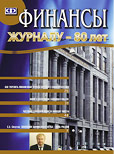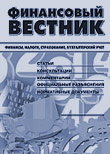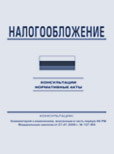Cодержание
Актуально
E-mail: finance-journal@ mail.ru
Министр финансов Московской области А.О. Котяков ответил на вопросы редакции журнала. В том числе он рассказал, почему принят трехлетний областной бюджет, как сформированы его доходная и расходная части, какие меры налогового стимулирования реализуются для поддержки малого бизнеса и др.
Ключевые слова: программные расходы, налоговые и неналоговые доходы бюджета, долговая политика, налоговое стимулирование, эффективность использования бюджетных средств.
Финансы и бюджет: проблемы и решения
Е.И Андреева, старший научный сотрудник Центра бюджетной политики Научно-исследовательского финансового института Минфина России
E-mail: andreeva@nifi.rumailto:andreeva@nifi.ru
Д.Г. Бычков, кандидат социологических наук, ведущий научный сотрудник Центра
E-mail: bychkov@nifi.ru
О.А. Феоктистова, кандидат экономических наук, старший научный сотрудник Центра бюджетной политики Научно-исследовательского финансового института
E-mail: feoktistova@nifi.ru
Несмотря на очевидные административные достоинства категориального принципа отбора получателей мер социальной поддержки, сегодня особую актуальность для российской бюджетной системы приобрел вопрос об усилении принципа адресности этих мер. Однако само понятие адресности в России до сих пор законодательно не определено.
В настоящей статье авторы пытаются ответить на вопрос, какой подход лучше всего подошел бы для измерения нуждаемости при оказании мер социальной поддержки в России? В частности, авторы показывают, что при всей привлекательности косвенной оценки нуждаемости, при которой оценка производится по сконструированным показателям, увязывающим благосостояние семьи с обеспеченностью предметами длительного пользования, целесообразность ее применения в России не очевидна.
Авторы предлагают использовать для оценки нуждаемости при назначении мер по поддержке доходов традиционную документарную проверку доходов, усовершенствовав ее за счет уточнения методики их подсчета и с учетом имущественной обеспеченности домохозяйств.
Ключевые слова: меры социальной поддержки, принцип адресности и нуждаемость, уровень доходов и уровень потребления, косвенная (балльная, индикаторная) оценка благосостояния, располагаемый доход и имущественная обеспеченность домохозяйства как критерии нуждаемости.
Казначейство: становление и развитие
А.Ю. Пантелеев, руководитель Управления Федерального казначейства по Свердловской области, кандидат экономических наук
E-mail: mv.efremova@mail.ru
Т.В. Елсакова, начальник отдела доходов Управления
В статье рассматривается проблема высоких объемов отнесения денежных средств на невыясненные поступления, что имеет негативные последствия и для бюджетов бюджетной системы РФ, и для плательщиков, Концепция усовершенствования платежного механизма формирования доходной части федерального бюджета предусматривает решение многих задач, в том числе – по минимизации объема невыясненных поступлений, применению современных платежных сервисов на основе модернизации казначейских и банковских технологий. Авторы показывают, как эта задача решается в органах Федерального казначейства, в частности в Свердловской области.
Ключевые слова: платежный механизм невыясненные поступления, расчетные документы.
Налоги: теория и практика
E-mail: finance-journal@mail.ru
В редакционном материале содержатся краткие тезисы выступлений на юбилейной коллегии ФНС (совпала с ее 25-летием) И.И. Шувалова, А.Г. Силуанова, Э.С. Набиуллиной, Т.А. Голиковой, С.С. Собянина, М.В. Мишустина. Вместе с Минфином России ФНС добивается постепенного повышения налоговой культуры и доверия в отношениях между органами государственной власти и населением, внося весомый вклад в улучшение делового и инвестиционного климата в стране, хотя есть проблемы, ждущие своего решения.
Другой материал под этой же рубрикой посвящен состоявшейся в конце октября т.г. в Финансовом университете при Правительстве РФ конференции «Налоговая система России: взгляд в будущее». Основной докладчик – глава ФНС М.В. Мишустин рассказал о том, как и при каких обстоятельствах складывалась налоговая система России, которую ныне отличают высокий уровень развития информационных технологий и централизация информационных потоков.
С точки зрения главного налоговика страны, Россия сегодня – это «нормальная страна» по организации налогообложения и администрирования налогов, успешно интегрирующаяся в процессы международного налогового сотрудничества.
Ключевые слова: становление налоговой системы, зарубежная практика, амнистия капиталов, центры обработки данных, экстерриториальность, горизонтальный мониторинг.
Н.С. Милоголов, научный сотрудник Центра налоговой политики Научно-исследовательского финансового института, кандидат экономических наук
E-mail: NMiligolov@nifi-abik.ru
В статье проводится анализ правил налогообложения контролируемых иностранных компаний (КИК), действующих в России, в свете рекомендаций ОЭСР, выпущенных в рамках Проекта BEPS ОЭСР/G20. Автор критически рассматривает каждый из блоков правил налогообложения КИК и приходит к выводу, что в большинстве случаев российские правила соответствуют лучшей международной практике, несмотря на присутствие определенных отличий.
Ключевые слова: налоговая политика, контролируемые иностранные компании, деофшоризация, нейтральность экспорта капитала, размывание базы, вывод прибыли.
Т.С.Тюрина, ст. преподаватель Калужского филиала Финансового университета при Правительстве РФ
E-mail: Tamaratyurina17@mail.ru
В работе рассматривается применение налоговых льгот в РФ, проанализированы данные о налоговых льготах для инвесторов, применяемых на территории Калужской области, дается оценка эффективности налоговых льгот. Выявлены некоторые трудности, препятствующие проведению достоверной оценки налоговых льгот в регионе. Автор сформулировал некоторые практические предложения, направленные на повышение отдачи от налоговых льгот и ее замеры.
Ключевые слова: налоговая льгота, оценка эффективности механизма льготирования, регион, нормативная база.
E-mail: finance-journal@mail.ru
В материале содержится обзор выступлений на круглом столе, проведенном в Финансовом университете, основное внимание в которых было уделено трудностям с внедрением и распространением кадастровой оценки налогооблагаемых объектов, пробелам в законодательной базе. Оценивалась в целом ситуация с имущественными налогами с точки зрения их администрирования и вклада в доходную часть региональных бюджетов.
Ключевые слова: кадастровая оценка, имущественные налоги, объекты налогообложения, налоговые вычеты.
Страхование
E-mail: finvestnik@mail.ru
Российский антитеррористический страховой пул (РАТСП) подвел итоги своей работы за 2015 од. Руководитель пула А. С. Гульченко в связи с этим ответил на вопросы редакции журнала, рассказав о росте поступления страховых премий по антитеррористическому страхованию, операциях РАТСП в перестраховочной сфере, стандартах деятельности пула, выплатах по страховым случаям и отношении к проекту создания в России Национальной перестраховочной организации. Отдельно затрагивается вопрос об участии страхового бизнеса и его объединений в превентивной деятельности, позволяющей надежнее защитить интересы страхователей и сократить вероятность совершения террактов.
Ключевые слова: страховой пул, перестрахование, террористические риски, международной перестрахование, государственный перестраховщик.
E-mail: finvestnik@mail.ru
В материале Э.С. Гребенщикова прослеживается история создания в конце 2001 г. российского антитеррористического страхового пула сразу вслед за взрывом террористами башен торгового центра в Нью-Йорке в 2001 г. Анализируются также особенности страхования и перестрахования рисков терроризма и диверсий на международном рынке. Усиление угроз и опасностей, исходящих от международных террористических группировок заставляет страховщиков обновлять свои страховые программы и расширять географию страхования.
Ключевые слова: вероятность, страховое покрытие, выплаты жертвам, размер ущерба, страховые события.
С.И. Рыбаков, генеральный директор страхового брокера «РИМС», кандидат экономических наук
E-mail: serguei.rybakov@rifams.ru
В статье исследуются современные подходы и меры, применяемые на зарубежных рынках для защиты прав и интересов страхователей. Подобные положительные образцы международной практики могут быть, по мнению автора, адаптированы на российском страховом рынке. Акцент сделан на таких темах, как раскрытие информации, «периода охлаждения», ответственности поставщиков и законодательных аспектах.
Ключевые слова: защита потребителей страховых услуг; зарубежный опыт; государственное регулирование страхования; страховой надзор.
Вопросы теории финансов
А.З. Дадашев, доктор экономических наук, профессор кафедры финансов и цен Российского экономического университета имени Г.В. Плеханова
E-mail: azd120840@yandex.ru
Д.А. Мешкова, доцент Академии социального управления Министерства образования Московской области, кандидат экономических наук
Статья посвящена разработке теоретических и методологических подходов, связанных с развитием теории финансов, теории, которая первоначально возникла в виде учения о доходах государства и его расходах. В данной статье раскрывается природа финансов, экономическая сущность и функции финансов. В методологическом плане финансы исследуются как триединая совокупность взаимосвязанных общегосударственных финансов, финансов организаций (предприятий) и финансов домашних хозяйств (личных финансов). Перечисленная триада финансов рассматривается как единая система движения денег, как финансовая система страны, в которой все части (подсистемы) автономны и изменения в одной из них непременно проявляются в остальных частях. Финансы показаны как отношения, которые проявляются в сфере обращения и охватывают стадию распределения вновь созданной стоимости и стадию обмена в процессе воспроизводства общественного продукта. Впервые разработан состав целей и функций каждой из трех подсистем финансовой системы.
Ключевые слова: налоги, доходы, финансы, финансовые ресурсы, финансовая система, цели и функции подсистем.
В.В. Тараканов, ректор Волгоградского государственного университета, доктор экономических наук
E-mail: rector@volsu.ru
Н.А. Кизатова, экономист, Волгоградский государственный университет, филиал г. Волжск
На современном этапе развития экономики образования важнейшее значение приобретают: теоретическая разработка, апробация и внедрение методов финансового анализа процессов в образовательной сфере на уровне учреждений и их структурных подразделений. Необходимость в достижении эффективного баланса материально-технических, финансовых, организационных и иных ресурсов, направляемых на развитие образования, уже потребовали введения нормативно-подушевой модели финансового обеспечения деятельности организаций ВПО. В настоящее время на первый план выходят вопросы эффективности организации учебного процесса и методики оптимального финансового управления образовательными учреждениями. С другой стороны, государственный заказ на подготовку специалиста, удовлетворяющего современным экономическим и социальным требованиям, потребовал введения системы индивидуальных образовательных траекторий. При этом если педагогические и психологические аспекты выстраивания индивидуальных траекторий нашли свое отражение в публикациях, то исследований, посвященных финансовым аспектам внедрения данной системы – практически нет.
В данной работе предложены две финансово-математические модели и соответствующие методики расчета финансового обеспечения реализации индивидуальных траекторий обучения.
Ключевые слова: индивидуальная траектория обучения, финансовое обеспечение, алгоритмы управления финансовой деятельностью университета.
Финансовый контроль и аудит
О.В. Шинкарёва, доцент кафедры экономики, математики, учетных и финансовых дисциплин Института менеджмента Московского городского педагогического университета, кандидат экономических наук, доцент
E-mail: shinkareva_ol@mail.ru
Статья посвящена анализу международных стандартов контроля в общественном секторе, разрабатываемым Международной организацией высших контрольных органов ИНТОСАИ и российского законодательства. Проводится сравнение содержания стандартов различных уровней с российскими нормативно-правовыми актами. На основе проведенного анализа даются рекомендации по совершенствованию методологического обеспечения государственного и муниципального финансового контроля в Российской Федерации.
Ключевые слова: государственный финансовый контроль, муниципальный финансовый контроль, внешний контроль, внутренний контроль, аудит, Счетная палата, Международная организация высших контрольных органов, стандарты.
Научные исследования аспирантов и соискателей
А.А. Курилин, аспирант кафедры «Финансовые рынки и финансовый инжиниринг» Финансовый университет при Правительстве РФ
E-mail: kurilinaleksey@list.ru
В статье рассмотрены проблемы развития инвестиционного процесса в системе негосударственного пенсионного обеспечения (НПО) в контексте реализации принципов размещения средств пенсионных резервов. Сделаны предложения, направленные на стимулирование институционального развития системы НПО и способствующие повышению эффективности управления портфелями фондов.
Ключевые слова: негосударственное пенсионное обеспечение, принципы размещения средств пенсионных резервов, эффективность управления портфелем фонда.
Annotation
E-mail: finance-journal@mail.ru
Minister of Finance of the Moscow region A.O. Kotyakov answered the questions of the journal. He explained the adoption of three – year regional budget, formation of its revenue and expenditure parts, implementation of tax stimulation measures for support of small business and etc.
Keywords: program costs, tax and non – tax revenues of the budget, debt policy, tax stimulation, efficiency of use of budget funds.
E.I. Andreeva, Senior Researcher, Center for Budgetary Policy, Financial Research Institute, Moscow, Russia.
E-mail: andreeva@nifi.ru
D.G. Bychkov, PhD equiv. (Sociology), Leading Researcher, Center for Budgetary Policy, Financial Research Institute, Moscow, Russia.
Email: bychkov@nifi.ru
O.A. Feoktistova, PhD equiv. (Economics), Senior Researcher, Center for Budgetary Policy, Financial Research Institute, Moscow, Russia.
E-mail: feoktistova@nifi.ru
In spite of the obvious administrative merits of using the category-based approach to targeting social benefits, policy makers in Russia more and more acknowledge the need to switch to methods that would allow to achieve better targeting outcomes. However, the concept of targeting as it applies to social spending has not been legislatively determined in Russia.
In international practices, targeting rate is one of the main criteria of the efficiency of social support. Household wealth can be measured either directly, i.e. based on income or on consumption, or indirectly, by measuring the assets held by the household. Each approach to measurement has its strengths and weaknesses. Which approach is best suited for Russia? The authors show that for all their attractiveness indirect, or proxy means measurement methods is hardly the obvious choice in case of Russia.
The authors suggest improvements to the direct means measurement approach, such as taking into account the assets held by the households and making adjustments for a number of mandatory expenditures, which are not the covered by the means testing methodology currently in use in Russia.
Keywords: social benefits, targeting, poverty, level of income, living standards, proxy means testing, disposable income, assets as a measure of household wealth.
A.Y. Panteleev, head of Administration of the Federal Treasury across the Sverdlovsk region, candidate of economic sciences.
E-mail: mv.efremova@mail.ru
D.G. Bychkov, T.V. Elsakova, head of department of revenues of Administration.
Article considers the problem of high volumes of allocation of funds to uncertain receipts that has negative consequences both for budgets of budget system of the Russian Federation and for payers. The concept of improvement of payment mechanism of formation of revenue part of the federal budget envisages solution of many problems, including the minimization of volume of uncertain receipts, use of modern payment services based on modernization of Treasury and banking technologies. Authors show how this problem is solved in the bodies of Federal Treasury, particularly in the Sverdlovsk region.
Keywords: payment mechanism of uncertain receipts, payment documents.
E-mail: finance-journal@mail.ru
Editorial material contains brief theses of speeches at the anniversary of Collegium of the Federal Tax Service (coincided with its 25th anniversary) of I.I. Shuvalov, A.G. Siluanov, E.S. Nabiullina, T.A. Golikova, S.S. Sobyanin, M.V. Mishustin. Federal Tax Service together with the Ministry of Finance of Russia obtains a gradual increase of tax culture and trust in relations between public authorities and population, making significant contribution to improvement of the business and investment climate in the country, although there are problems waiting for solution.
Other material in that series is devoted to the conference “Tax system of Russia: look into the future” passed at the end of October 2015 in the Financial University under the Government of the Russian Federation. The main speaker – head of the Federal Tax Service M.V. Mishustin told how and under what circumstances tax system of Russia was formed, which is currently characterized by a high level of development of information technologies and centralization of information flows.
From the point of view of the chief tax specialist of the country, Russia today is a “normal country” on organization of taxation and tax administration, successfully integrating into the processes of international tax cooperation.
Keywords: formation of the tax system, foreign practice, amnesty of capitals, data center, exterritoriality, horizontal monitoring.
N.S. Milogolov, Phd in Economics (candidate), Research associate at Tax policy center, Financial Research Institute.
E-mail: NMiligolov@nifi-abik.ru
There is comparative analysis of Russian controlled foreign companies rules with the OECD recommendations on the design of these rules issued as a part of BEPS OECD/G20 project. Analysis is provided separately on each building block of controlled foreign companies rules.
Keywords: tax policy, controlled foreign company, de-offshorization, capital export neutrality, base erosion, profit shifting, BEPS.
T.S.Tyurina, senior lecturer of the Kaluga branch of Federal state educational budget institution "the Institute of Finance under the Government of the Russian Federation"
E-mail: Tamaratyurina17@mail.ru
This paper examines the tax benefits in the Russian Federation, analyzed data on tax remissions on the territory of Kaluga region, assesses the effectiveness of tax incentives. Highlights the shortcomings that exist when assessing the effectiveness of tax privileges in the territory of Kaluga region. The author provides some practical suggestions for enhancing the effectiveness evaluation of the effectiveness of tax incentives, both at Federal and regional levels.
Keywords: tax benefit, assessment of the effectiveness of the mechanism preferences, region, normative base.
E-mail: finance-journal@mail.ru
Material contains an overview of presentations at the round table held in the Financial University, main attention in which was paid to the problems with the introduction and distribution of cadastral valuation of taxable objects and problems in the legislative base. Situation with the property taxes from the point of view of its administration and contribution to the revenue part of regional budgets was assessed in general.
Keywords: cadastral valuation, property taxes, objects of taxation, tax deductions.
E-mail: finvestnik@mail.ru
Russian anti – terroristic insurance pool (RATIP) summarized the results of work in 2015. Head of pool A.S. Gulchenko in this connection answered the questions of the journal, told about the growth of receipts of insurance premiums on anti – terroristic insurance, operations RATIP in reinsurance sector, standards of pool’s activities, payments for insurance cases and attitude to the project of creation of National reinsurance organization in Russia. Article separately touched upon a question about participation of insurance business and its associations in the preventive activities that allow protecting the interests of policyholders more effectively and reducing the possibility of committing the terroristic attacks.
Keywords: insurance pool, reinsurance, terroristic risks, international reinsurance, state reinsurer.
E-mail: finvestnik@mail.ru
Material of E.S. Grebenshchikov describes the history of creation of the Russian anti – terroristic insurance pool at the end of 2001 after the explosion of the world trade center by terrorists in 2001 and also analyzes the features of insurance and reinsurance of terroristic risks and diversions in the international market. Growing threats and dangers from international terroristic groups force insurers to update their insurance programs and expand the geography of insurance.
Keywords: probability, insurance coverage, payments to victims, amount of damage, insurance event.
S.I. Rybakov, general director of the insurance broker “RIMS”, candidate of economic sciences.
E-mail: serguei.rybakov@rifams.ru
The article investigates contemporary approaches and measures applied on foreign markets to protect rights and interests of insurance services consumers. Similar positive international practices could be adapted on the Russian insurance market.
This article was prepared as a result of research carried out at the expense of the budget funds by the state task 2015 of the Financial University under the Government of the Russian Federation.
Keywords: insurance services consumers' protection; international practice; state insurance regulation; insurance oversight.
A.Z. Dadashev, doctor of economic sciences, professor of chair “Finance and pricing”, Plekhanov Russian Academy of Economics, Moscow, Russian Federation.
E-mail: azd120840@yandex.ru
D.A. Meshkova, associate professor of the Academy of Public Administration of the Ministry of Education of Moscow region, candidate of economic sciences.
Article is devoted to development of the theoretical and methodological approaches connected with development of the theory of finance, the theory which originally arose in the form of the doctrine about the income of the state and its expenses. In this article the nature of finance, economic essence and functions of finance are revealed. In the methodological plan finance is investigated as triune set of the interconnected nation-wide finance, finance of the organizations (enterprises) and finance of house farms (personal finance). The listed triad of finance is considered as uniform system of the movement of money, as a financial system of the country in which all parts (subsystems) are autonomous also changes in one of them are by all means shown in other parts. Finance is shown as the relation which are shown in the sphere of the address and covers a stage of distribution of again created cost and a stage of an exchange in the course of reproduction of a public product. The structure of the purposes and functions of each of three subsystems of a financial system is for the first time developed.
Keywords: taxes, income, finance, financial resources, financial system, objectives and functions of the subsystems.
V. V. Tarakanov, Doctor of Science (Economics), Rector, Volgograd State University, Volgograd, Russian Federation.
E-mail: rector@volsu.ru
N.A. Kizatova, Applicant for a candidate degree at the Department of Finance, Credit and Taxation, Volgograd State University, Volgograd, Russian Federation.
E-mail: kizatova-nadya@yaundex.ru
The modern stage of the development of economics in education considers several factors as most important: theory development, testing and adoption of new methods of financial analysis of educational processes at the level of institutions and structural subdivisions in them. The need for the effective balance between material, technological, financial, organizational, and other kinds of resources intended for the education development has already required introducing a regulatory per capita model of financial implementation of the activity of the institutions of higher professional learning. At present, issues of the effective organization of the teaching process and optimal financial management of the educational institutions have become particularly urgent. On the other hand, the government order for a specialist meeting modern economic and social requirements has made it necessary to implement a system of individual learning trajectories.
Pedagogical and psychological aspects of individual trajectories having been touched upon in a number of published works, the research aimed at financial aspects of implementation of this system hasn’t been made yet.
The article offers two financial mathematical models and methods of estimating the financial basis for individual learning strategies. The first model presents as given the value of the regulatory part of educational program financing which is allocated for the remuneration of teachers’ labour. The cost of the individual learning trajectory is supposed to be calculated in proportion to the percentage of the respective components in the curricula bearing in mind the conditions and peculiarities of the organization of the teaching process.
The second model is based on the idea of calculating the estimated expenses aimed at the implementation of the individual learning trajectories bearing in mind the training-and-finance plans of the curricula. It offers an algorithm of calculating the regulatory part of financing teaching labour.
The implementation of the models suggested in the article will allow solving a number of problems related to the economic effectiveness of the organization of teaching and to the optimal financial management of an institution on the whole. In particular, it will make possible preliminary estimating of the individual learning trajectory costs.
Keywords: individual learning trajectory, financial provision, algorithms of managing the financial activity of a university.
O.V. Shinkareva, associate professor of chair “Economy, mathematics, account and financial disciplines” of the Institute of Management of the Moscow City Teacher Training University, candidate of economic sciences, associate professor.
E-mail: shinkareva_ol@mail.ru
Article is devoted to the analysis of the international standards of control in public sector developed by the International Organization of Supreme Audit Institutions (INTOSAI) and Russian legislation. Comparison of content of the standards of various levels with the Russian normative – legal acts is conducted. Recommendations on improvement of methodological support of the state and municipal financial control in the Russian Federation are given on the basis of the analysis.
Keywords: state financial control, municipal financial control, external control, internal control, audit, Accounts chamber, International Organization of Supreme Audit Institutions, standards.
A.A. Kurilin, postgraduate student of chair “Financial markets and financial engineering” of the Financial University under the Government of the Russian Federation.
E-mail: kurilinaleksey@list.ru
Article considers the problems of development of investment process in the system of non – state pension provision (NPP) in the context of implementation of the principles of allocation of funds of pension reserves and provides proposals aimed at stimulation of institutional development of the NPP and increase of the effectiveness of management of fund’s portfolios.
Keywords: non – state pension provision, principles of allocation of funds of pension reserves, effectiveness of management of fund’s portfolios.











